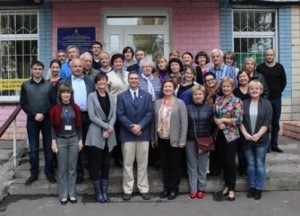
The International Training and Education Center for Health (I-TECH) Ukraine, in close partnership with the Ukrainian Family Medicine Training Center (UFMTC) at Bogomolets National Medical University (NMU), and under the auspices of the Ministry of Health (MoH) of Ukraine, has published a new facilitator guide, Modern Technologies for the Organization of Prevention of HIV/AIDS Transmission and Drug Use: The Role of Family Medicine Based Primary Health Care.
“This publication is a product of creative collaboration by a united team of experts in the areas of family medicine and HIV,” said Olga Vysotska, Director of the UFMTC at NMU. “It is a unique gift to the faculty of all departments at medical schools and colleges all over Ukraine that train medical doctors and nurses.”
The MoH of Ukraine recommends the guide as a tutorial for clinical interns and doctors enrolled in in-service or continuous medical education training programs, as well as for faculty of the Ukrainian medical universities and colleges that train medical doctors and nurses as general practitioners and family doctors.
The goal of the course is to provide participants with skills and knowledge in the early diagnosis, care, social adaptation, treatment, and early prophylaxis of HIV, specifically in combination with drug addiction, tuberculosis, and hepatitis, as well as to form the proper attitudes necessary for family physicians in Ukraine to provide effective services to HIV patients, and patients of at-risk groups.
The guide is based on the results of a pilot training event that took place in October 2014 at the UFMTC at NMU. Dr. Chris Behrens from I-TECH facilitated the event, along with nine leading national experts from NMU, the Ukrainian Center of Diseases Control (UCDC), the Ivano-Frankivsk Oblast Clinical Center for Palliative Care, and the Kiev City AIDS Center.
“It is the first of its kind in Ukraine; no such publications existed prior to this one,” said Dr. Vysotska. “In addition to their work on the most up-to-date clinical content, we really valued the methodological support provided by I-TECH during the training process and development of the guide, as well as the application of contemporary tools and approaches to adult education.”
The key areas covered by the course are:
- HIV/AIDS epidemiology, both globally and in Ukraine, including the roles of primary health care and family medicine in responding to the HIV/AIDS epidemic
- Pathophysiology, pathogenesis, and stages of HIV infection, including key diagnostic methods
- Palliative care for HIV/AIDS patients by family doctors.
- Antiretroviral therapy (ART)
- Diagnosis and management of co-infection (HIV/TB/virus, hepatitis B and C) in family practice
- HIV in pregnant women, including prevention of mother-to-child transmission
- Management of patients with HIV and drug addiction, including opiate substitution therapy (OST)
- Post-contact prophylaxis, including universal precautions (international and Ukrainian standards)
“The process of development of this product by a multicultural, multiprofessional team of experts was vibrant, mutually enriching, and very satisfying,” said Anna Shapoval, Country Representative for I-TECH Ukraine. “We are most grateful to the Ministry of Health of Ukraine, HRSA of the US Department of HHS and CDC in Ukraine for their support and guidance through this project and look forward to new initiatives of this kind together with our national partners.”
For more information about the guide, please visit: http://www.ex.ua/618786634523